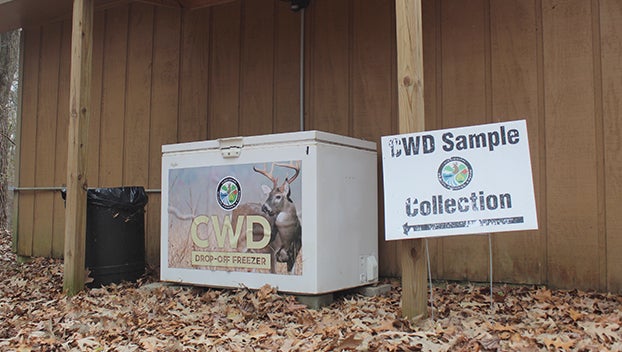Commission places Claiborne County fully in CWD management zone
Published 1:10 pm Thursday, February 22, 2024

- Chronic Wasting Disease samples can be dropped off at Natchez State Park. You can take antlers as long as you leave the skull plate and neck with lymph nodes attached at the drop off cooler. Hunters fill out a sample card at the station with their name, contact information and where the deer was harvested. CWD samples are needed across Mississippi to find new areas of the disease to better contain the disease. (Hunter Cloud | The Natchez Democrat)
|
Getting your Trinity Audio player ready...
|
CRAWFORD — Mississippi Department of Wildlife, Fisheries and Parks Commission voted to place Claiborne County fully in the Chronic Wasting Disease Zone Thursday. The vote came at a regularly scheduled monthly meeting at Black Prairie Wildlife Management Area.
Chronic Wasting Disease is a 100 percent always fatal disease in deer and other members of the Cervidae family. CWD is caused by an infectious prion, misfolded protein, which is mainly shed through bodily fluids of infected deer. Healthy deer can get CWD through direct contact with infected deer or indirect contact with prions in the environment where the prions are known to persist.
MDWFP reported Claiborne County’s first detection of CWD on February 7. The detection was on the east side of the navigational channel of the Mississippi River and west of Port Gibson. Mississippi State University detected CWD prions in a scrape last summer.
Commissioner Leonard Bentz made it clear that the west portion of Claiborne County was always in the CWD management zone. MDWFP commissioners took the east portion of Claiborne County out of the zone at their Nov. 2022 meeting at the bequest of a Lincoln County resident who was supplemental feeding illegally on his property and a business owner selling feed corn in Vicksburg. Commissioners ignored further pleas by Claiborne County landowner Ed Penny to reinstate the supplemental feed ban in the county at the Dec. 2022 commission meeting and Jan. 2023 meeting.
Under the CWD management zone, there is a supplemental feed ban in Claiborne County along with a carcass exploitation ban. These measures are considered best practices to mitigate the spread of CWD by state wildlife agencies across the nation.
CWD update
Wildlife Bureau Chief of Staff Russ Walsh gave an update on CWD surveillance in Mississippi for the Fiscal Year 2024. Deer season is over and hunters submitted 8,300 samples with 110 CWD detections.
Walsh said the detections were up 50 percent from 2022. Mississippi has found 317 positives since 2018 in 16 counties with six new counties detecting a positive this year. Taxidermist helped collect samples for CWD testing.
“Our taxidermy program has been successful. We thank our taxidermist for helping us,” Walsh said. “A lion’s share of the samples come from our taxidermists.”
Tate County is one of those new counties which detected a positive. The positive in Tate County is the first one detected in a high fence enclosure in Mississippi. Walsh said it is a confirmed positive.
Statewide supplemental feed ban
Bentz asked Walsh what the Wildlife Bureau thought about a statewide supplemental feed ban. He said he understood it is a hot button topic but maybe Mississippi should extend the feed ban from beyond the CWD counties.
Walsh said it was something they could look into.
“We would have that discussion under disease management. Feeding can cause disease conflicts with other wildlife,” Walsh said. “If we approach it as disease management it is a worthy discussion we could have. We need to lay out all that comes with it. Risks that come with feeding.”
Commissioner Scott Coopwood asked if the staff could research if a feed ban would slow down CWD and get feedback from the public. Bentz suggested the science already shows CWD spread is mitigated by feed bans but why not eliminate it across Mississippi.
Commission Chairman Bill Cossar said he was not in a position to vote on the issue Thursday. William Mounger suggested they have time to look into it before next deer season. Coopwood voiced support for Bentz’s idea.
“I think it is worthwhile to look into this and be very serious about it,” Coopwood said. “IS there any way to project if you paused CWD feeding if it would slow down the spread? I think it is worthwhile. Let’s be very serious about it.”
Mounger answered Coopwood’s question about CWD and feeding. MSU research shows CWD prions are left on feeders and work in Arkansas shows matrilinear doe groups interact a lot more around feeders than they would in the natural environment.
He said he would like to get all of the facts and come up with a solution.
“It is something we should look at hard,” Mounger said.
MDWFP Commission will next meet at Percy Quin State Park in Pike County on March 21 at 10 a.m.






